Rockbridge Academy Blog
Faith in Action: Summer Missions with Mr. Swanson
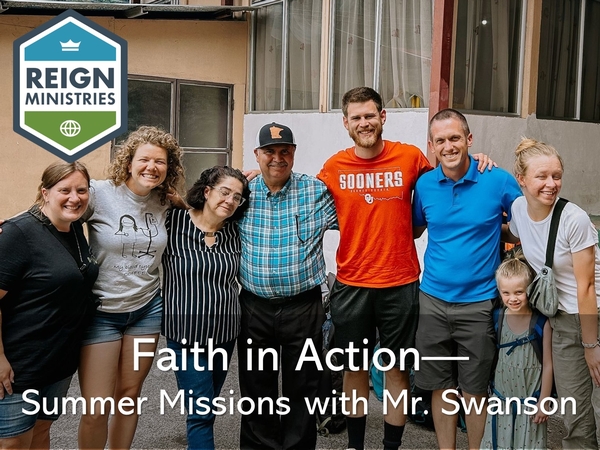
My passion and calling in life is to make disciples of Jesus, and part of how God has led me to do that is through leading mission trips with Royal Servants Mission Trips during my summers away from teaching Bible at Rockbridge Academy. Royal Servants is a division of Reign Ministries, an organization that exists to build and advance the kingdom of God by developing youth and youth leaders who have great commandment hearts and live great commission lifestyles.
My first summer with Royal Servants was as a 17-year-old student. I loved the community of a Royal Servants team. It was a powerful experience to be a part of a team of my peers who were all focused on a unified mission for Christ as they worshiped and sought the LORD together in the Scriptures. Sharing the gospel was a really stretching experience for me, especially cross culturally. I loved every minute. I returned for a second and third year as a student and received leadership training and the opportunity to study the Bible in Israel. After I started teaching in 2008, it was a no-brainer to return to serve with Royal Servants during the summers and help provide that same discipleship experience for the next generation of students.
We believe that this sort of training and mission experience can be an integral part of growing young people into what David Kinnaman calls “resilient Christians” who are able to sustain and live out their Christian faith in a post-Christian culture.
A Royal Servants Trip is different from many other mission trips. They are between 5 and 8 weeks long and start with intensive training at our camp prior to going overseas. As a part of the trip, there is an intensive discipleship training program that each middle school, high school, and college student goes through. We study and memorize the Scriptures together, talk about the Word in small groups, worship, and learn how to effectively share the Gospel in a cross-cultural setting. Our trips are not meant to be an end in and of themselves but are field experience and a part of the training to go, live out, and share the Gospel at home. It is a summer of service for a lifetime of ministry.
We send teams all over the world each summer. Last summer (2023), my wife Stacey and I, along with our three children, led a trip to Costa Rica where Royal Servants has been partnering with a church for 20 years. Our ministry is focused on connecting our students with other teenagers and giving them the opportunity to share the Gospel. Most days we traveled to a nearby town and set up at the local soccer field. We would play pickup games of soccer along with other games and activities. We also used dance, drama, and puppets (for little kids) to build a crowd and share the Gospel. Members of the youth group from our church partner joined us as interpreters since most of our students did not speak much Spanish. On our last day of ministry, we had been invited to the local elementary school to serve in the classrooms during the morning. During recess, we played and shared the Gospel. After lunch, Pastor Alfonso, the Costa Rican pastor with whom we partner, had the chance to do a special assembly with 5th and 6th grade students. During that time, 15 students prayed to put their faith in Christ. It was an awesome way to end our ministry in Costa Rica.
We continue to find that spending five weeks away from the routines and distractions at home and moving into an intentional community focused on seeking and serving Jesus continues to be a profound and life changing experience for many students.
We continue to find that spending five weeks away from the routines and distractions at home and moving into an intentional community focused on seeking and serving Jesus continues to be a profound and life-changing experience for many students. We believe that this sort of training and mission experience can be an integral part of growing young people into what David Kinnaman calls “resilient Christians” who are able to sustain and live out their Christian faith in a post-Christian culture. We had one Rockbridge student join us last summer. We plan to continue to serve in Costa Rica this summer (2024) and, LORD willing, for years to come. We would love to have more Rockbridge students join us in serving Christ around the world this summer. Would you or your student be willing to join us in a life-changing summer of seeking Jesus together?
Please contact me at mswanson@rockbridge.org for more information.
CLICK HERE to read the final update from our summer 2023 trip.
Matt Swanson, a graduate of Gordon-Conwell Theological Seminary, has served as an upper school Bible teacher for 16 years and has been leading Royal Servants Missions Trips for 14 years. He joined Rockbridge Academy in 2022. Matt and his wife, Stacey, have three children.
Classical Christian Science: Competency Plus Virtue
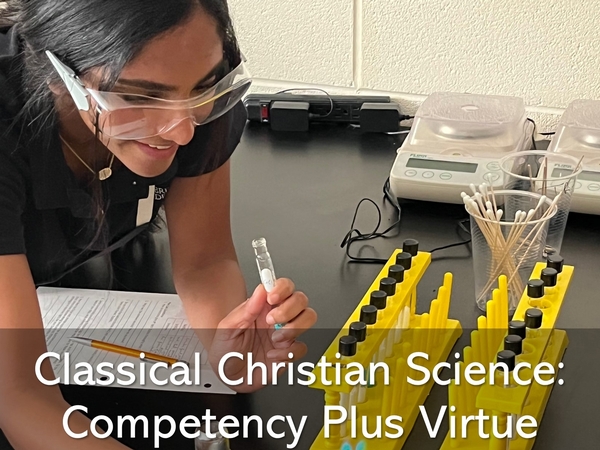
"Science is the search for the truth.”
– Linus Pauling, founder of Quantum Chemistry & Molecular Biology
Imagine a medical student memorizing cardiovascular system pathology for his licensing exam. Picture a pilot polishing up her landing skills in an aircraft simulator. Think of a teenage boy playing a car-racing video game. When does the medical student learn compassion for his patients? How does the pilot train for the courage that gives her a steady hand? Which game module teaches the adolescent driver good judgment? All three scenarios present a person who has trained for hours, weeks, or even years honing the skills necessary for their vocation; yet all three are missing elements essential to their roles. In contrast, a classical Christian education seeks to develop the whole person from competency to relationship to virtue. At Rockbridge, science classes are no exception.
Consider a scientist who has completed all the necessary education to be a leader in her field. She is familiar with cutting-edge research, and she has the analytical skills to design and build solutions. But in which class did she learn to appreciate the complexity of real-world problems? What research did she do on the ethics of her specialty? How much training has she had on written and oral communication to experts and decision-makers in the broader world? Modern scientists are trained to be competent, but lack preparation in interpersonal skills and moral character.
Science knowledge has exploded in the last century. The reflex response in education has been to cram more technical skills into the science classroom. In contrast, a liberal arts education is larger than the mere transmission of technical information. Modern classical science aims to combine practical knowledge with transformation of the social and personal aspects of a student’s character. As a classical Christian school, Rockbridge Academy pursues this transformation in light of biblical truths which develop the student as a bearer of the imago Dei.
In the dialectic years, students cultivate disciplined mental habits through systematic training in logic and Latin. As they move into rhetoric science, the focus shifts to developing habits in both computational and analogical thinking. While memorization and repetition are important, we eschew any method that limits learning to regurgitation of facts and algorithms in order to pass a test. Robust learning must be held in tension with contemplation, wonder, rest, and connection to the narrative of science, the story through which we see God’s incredible creation.
Do nothing from selfish ambition or conceit, but in humility count others as more significant than yourselves. Let each of you look not only to his own interests, but also to the interests of others.
– Philippians 2:3-4
The prevailing secular model for bright students seeking to make an impact on the world is a laser-like focus on areas of self-interest: grades, accolades, and individual accomplishments. As Rockbridge students build a foundation of scientific competency, we seek to create an environment which is truth-seeking for the benefit of the whole, not advantage-seeking for the benefit of the one. Rhetorical skills in speaking and writing are developed and used to teach and mentor others. Students are encouraged to ask questions about science and faith as they practice thinking deeply and putting difficult thoughts into words. They are led to see their developing abilities in the light of humility and stewardship: the humility of seeking truth rather than seeking rewards, and stewardship of the earth as we partner with God to be redeemers of culture and creation.
Foremost, our goal for the students at Rockbridge Academy is to guide their journey into full personhood. From the early days of grammar school until the final year of rhetoric, science students are encouraged to order their loves as they seek knowledge. We worship the Creator and have confidence in Him alone. We learn with boldness and purpose, not with fear of an unknown future. Our posture toward truth is one of awe as we see the Creator’s fingerprints on all of creation. We pray for students to leave these halls with every part of their education integrated into a whole, harmonious person: able to fulfill God’s call as stewards of creation, liberated in the freedom of Christ.
Robyn Kennedy has a degree in chemical engineering and a background in manufacturing and data acquisition systems. She teaches upper school science at Rockbridge Academy. Her husband is a retired Navy captain, and she and her family have served our country for many years at duty stations all over the world and around the country. She has four children and three of them are currently students at Rockbridge Academy.
5 Lessons I Learned on Grand Tour
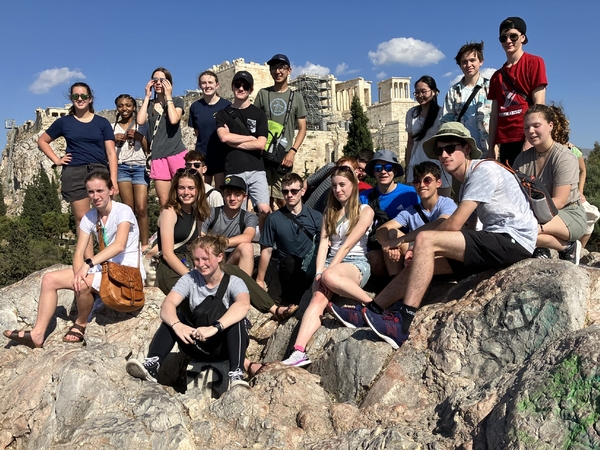
It is the trip everyone looks forward to from kindergarten, the capstone of classical Christian education at Rockbridge Academy: Grand Tour. Grand Tour is a seventeen-day trek through some of the most historic places in Greece and Italy, where we spend nights in seven different hotels and a ferry, eat amazing food, and experience ruins, churches, museums, and breathtaking views. I'm grateful for the incredible experiences and learned valuable lessons along the way.
1. The priorities of man have not always been the same.
What a society creates says much about what they value. For instance, the Parthenon is a Greek temple in Athens whose construction began in 447 BC and is mostly still standing today. Clearly this temple was built to last. Many of the cathedrals, chapels, and basilicas we see in Italy are multiple centuries old and still in use today. We don’t have anything like that in the United States. In fact, we usually have the exact opposite. Our culture values efficiency, not longevity. We mass produce cookie-cutter houses in huge neighborhoods, get our coffee in cardboard cups without leaving our cars, and Amazon Prime just about everything. It is easy to forget that our priorities were not always the priorities of the past and still aren’t the priorities of people in other parts of the world. I went to restaurants where we ate dinner for three hours and saw buildings that are three times the age of our entire country. It was fascinating to step into another culture and experience their different values and priorities.
2. Man’s creations do not last forever.
Despite such an emphasis on longevity, it became abundantly clear that man’s creations do not last forever. Even with the impressive efforts of the ancient Greeks, there are extensive portions of the Parthenon missing and much of what we saw in Greece are now in ruins. The fact that any of these temples, villages, and buildings still exist in some capacity today is incredible. However, the ruined state of man’s labor serves as a humbling reminder of man’s limitations. The fallen pillars and marred stones stand in stark contrast to the giant mountains in Delphi, clear water on the Gulf of Corinth, and beautiful countryside in Assisi, all of which remain majestic and unscathed. This is God’s creation, utterly immovable and long lasting, and it is far greater than anything man could dream up himself.
3. All of man’s creation points to the ultimate Creator.
Although man’s creations are unimpressive beside God’s majestic work, we continue to create. It would be absurd to assume that anything man makes is entirely from his own volition and ideas. All that is in this world was inspired by God and is under His dominion. This being the case, everything we create points to the ultimate Creator. This fact was incredibly evident on Grand Tour. Greece’s many ruined temples are evidence of the emphasis placed on a supreme being, and the art and architecture of the Enlightenment is steeped in religion. One can not walk out of the Borghese Gallery without at least contemplating a higher power. The way Saint Peter’s Basilica constantly drew my eyes heavenward or the way Michelangelo's sculptures celebrated God’s greatest creation reminded me of the one whom we all will ultimately glorify. Creating is a gift unique to mankind, and it is a gift that magnifies the true Creator.
4. “All are from the dust, and to dust all return” (Ecclesiastes 3:20).
Possibly my favorite site we visited on Grand Tour was the Catacombs. The Catacombs of San Callisto is an ancient burial site in Rome where approximately five hundred thousand Christians were buried. We were able to descend into the Catacombs, walk through a few of many passageways, and see now empty graves and burial chambers which used to hold ordinary Christians as well as popes and martyrs. At one point along the way, I saw a glass case that held the disintegrated remains of a boy who had been buried in the Catacombs. What had once been a walking and talking human like me was reduced to powder, and all I could think of was that verse from Eccesiastes: “all are from dust, and to dust all return,” (Ecc 3:20). In Genesis 2, God created the first man out of dust from the ground and breathed life into him. It was a quieting experience to walk where my brothers and sisters in Christ had once laid their dead and remember that even the bodies of God’s people will one day return to the ground. However, it was also a joyful reminder of God’s grace and faithfulness that the dust of our bodies is not the end of our lives, but rather the beginning of our soul’s eternity with Him.
5. Beauty is essential.
If you go on Grand Tour and your jaw does not drop at least once a day, you are missing something. Beauty is everywhere, but it is incredibly evident on this trip. It was present in the Grecian countryside, in the main temple ruins, in the middle of the Adriatic sea, and in every painting, church, and sculpture. As we began to see these churches, I wondered about the morality of putting so much money and resources simply into making something beautiful. After all, Christians can worship God in a hole in the ground just as well as they can in the Sistine Chapel. However, the further along we got, the more convinced I was of the importance of beauty. I will not pretend to know the motives behind all of the beautiful churches, paintings, and sculptures we saw, but I can speak to the reaction they evoked. I and those around me were continually in awe. The beauty of these places created an environment that demanded reverence. Yet, for me, it was never toward the beautiful thing itself or the man who made it, it was always for a God who allows beauty such as this to exist. Man was created to marvel, and it seems that proper beauty evokes its siblings, goodness and truth, in such a manner that makes our God simply undeniable.
I could not be more grateful for the opportunity God has given me to go on this trip and learn these lessons along with many others. Grand Tour is a time to learn: learn about yourself, learn about your classmates, learn about God, and learn about His majestic creation. Grand Tour is truly unique, and its blessings are beyond words. I look forward to seeing what future Rockbridge students learn in Europe!
Olivia Reardon, ‘22, is attending Messiah University where she continues to pursue her passion for reading, writing, teaching, and dance. While she loves learning, quality time, and ice cream, she is particularly passionate about serving Christ in all that she does and says.
Why Do We Pray?
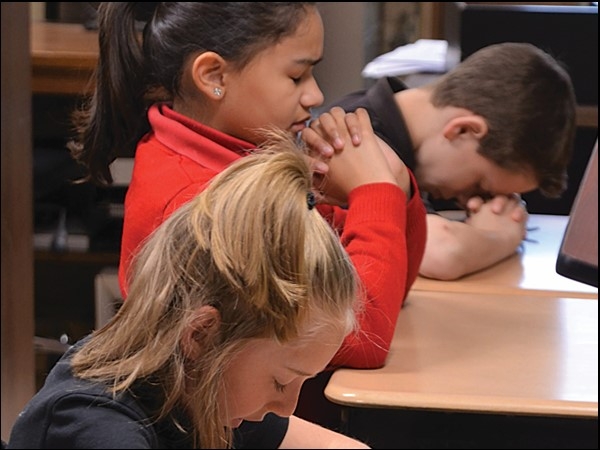
While I (class of 2019) was still at Rockbridge Academy, every Thursday at 11:30 AM, a half dozen high school guys would trickle one by one into Mr. Lawing’s classroom, snack on our lunches, chat for a few minutes, and then, for the rest of lunch, pray. When I happened to be at Rockbridge on a Thursday visit, I had the privilege of joining that same prayer group. I was reminded of just how precious these times of prayer are. I still consider Thursday prayer one of the best parts of my Rockbridge experience.
But prayer at Rockbridge is by no means the special province of Mr. Lawing and his Thursday prayer group. The whole life of the school is soaked in prayer. Prayer at the beginning of a school day, at the beginning of class, at the beginning of lunch. Prayer on the stage at concerts and on the starting line at cross-country meets. And of course, that tearful and joyful prayer for the seniors on their last day. From start to finish, Rockbridge is a praying school.
Why is that so? Why do we pray so much at Rockbridge? Do we believe God needs constant reminders to bless us? Do we believe He needs our suggestions to run the world? Do we believe He needs our permission to act? Or do we pray simply out of duty, uttering words into the sky with no real hope, or even desire, of an answer?
None of these are the reasons God gives us to pray. God is good, needing no reminders to bless His people. God is wise, needing no suggestions to govern His creation. God is sovereign, needing no permission to work His will. And, as we are united with Christ through faith, God is our Father. He will surely hear, and answer, His children’s requests. And this is why we pray. We pray because we want an answer. We pray because we expect an answer. This is the reason our Lord Himself gave His disciples: “Ask, and it will be given to you; seek, and you will find.” Do you want to receive? Then ask! Have you asked? Then you will receive!
It’s rarely easy, though, to live as though God really does answer prayers. Perhaps we’ve prayed for many things which we haven’t received: a test aced, a game won, a relationship restored, an ailing family member healed. How can we make sense of those apparently unanswered prayers? Were we just not praying sincerely enough? Some would say so, telling every disappointed believer to simply pray harder. But Scripture gives different counsel: God is His own master. He is not bound to grant our every wish: “He does according to His will among the host of heaven, and among the inhabitants of the earth; and none can stay His hand, or say to Him, ‘What have you done?’” (Daniel 4:35). At the end of the day, God does His will, not ours.
This is not, on the surface, the most comforting answer. What it sounds like is this: when I pray, God will give me what I ask for, but only if it happens to be what He was going to do all along. It doesn’t sound like prayer actually changes anything. And in a certain sense, that’s true. Prayer doesn’t change anything, in that neither the prayers of the saints nor the curses of demons can shake Christ from His throne or erase from His heart one word of the Covenant of Redemption. God has written His story, from “In the beginning” to “Happily ever after,” and that story cannot be changed. What we often forget, though, is that our prayers themselves are part of that story.
We can’t fully wrap our minds around it, but it’s true and vitally important. When God’s people pray and He answers them, it’s not that they happen to request the very thing He was planning to do anyway. Rather, God Himself placed that prayer on their hearts, in order that they might experience His faithfulness when He answers it. Or perhaps God’s people pray and He does not give what they ask. In that case, He placed that prayer on their hearts in order that they might experience His faithfulness by waiting. This is what happened to the Apostle Paul: he says the Lord gave him a thorn in the flesh, prompting him to pray three times for relief, in order not to take it away, but to tell him, “My grace is sufficient for you.”
So why do we pray? We pray in order that we might receive. But deeper than that, we pray that we might learn God’s faithfulness. We pray that we might learn His faithfulness the pleasant way, when He hears us and leads us through green pastures. We pray that we might learn His faithfulness the hard way, when He hears us and leads us through the valleys of deep darkness. We pray that we might learn it is by His faithfulness we live, that we might learn to rest in His faithfulness and not our own strength, that we might see His faithfulness fully displayed on that day when all prayers are at last answered.
Nathan Daly, '19, currently studies computer science and math at Johns Hopkins University.
Why Do WE Read Hard Books?

In a previous article, I argued that we should not really have a problem reading hard books. That, “it is hard” is not a fit excuse to avoid it; in fact, the very labor, by strengthening the mind, makes us more fit to read, absorb, and love harder and even greater books, most especially the Word of God.
I wanted to address one other word in the question, though: the word “we.”
Why do we read hard books?
Again, I, too, struggled with Milton, failing three times to get beyond book 2 of the epic. Yet, as I said before, I was largely responsible for pushing to re-introduce Paradise Lost into the freshman curriculum, and that losing the chance to read and re-read that book with Rockbridge students was the great regret of an otherwise wonderful load-lightening which preserved my sanity.
What I did not do was discuss how my attitude changed.
It has to do with “we”.
In the summer of 2008, I was blessed to be in my third year at St. John’s College. Each summer, we would choose a preceptorial—a set of readings and discussions that dove deeper into a particular work than the other courses had time to. Paradise Lost was one of the preceptorial options, and my intention was to avoid it, but my colleague Brad Finkbeiner persuaded me to take it with him.
Eight weeks later, I was hooked. What happened?
The classical methodology happened. We would read one book at a time, independently; our only requirement was that we come back to class equipped with a question we had about the text. (That part was not hard; I had lots of those.) Class began by presenting those questions, the best of which became apparent by how well they drove us into discussing the text, flipping back and forth from one page of the poem to another, comparing lines, trying to understand how a nuance, here, shaped the bigger picture. These were not debates—though sometimes if someone was demonstrably wrong a brief debate might flare up—so much as explorations: explorations of something that was great and good and, yes, hard.
Part of my mistake in reading Paradise Lost the first time was simply that I did not have the intellectual equipment to read it alone: I needed a guide, and I needed companions. Our tutor, Mr. May, was a true guide: more than a referee, much, much less than a lecturer. He fostered discussion that focused on Truth of the text and which demanded that we read more and more closely, discuss more and more carefully, listen to the other students around the table with a more gracious but still critical ear.
The “we” of dialectic happened.
It is that revolving pattern–the lone reader puzzling out the text at midnight (rocking my infant son to sleep), then coming together around a table at which we all sat puzzling about Milton—that pattern is the one that made the hard book not less hard, but less heavy.
Many hands make light work. In this case, many eyes made the work light—what had been dark, I could begin to see...
♦ the beautiful intricacies of Milton’s poetics, poetics that weighed each syllable and how it carried his point…
♦ the goodness of characters like the angel Abdiel, adamant, the lone rebel against a rebellious Satan, “Among the faithless, faithful only hee;/ Among innumerable false, unmoved…”
♦ the Truth as Milton—broken, blind, outcast—could see it: that an infinite God of infinite goodness must overwhelm the evil that seems, in the moment, to overwhelm us…
And that has been the delightful pattern of the last four years: four additional passes through Milton with Mrs. Ward and with these students, some of whom have brains that bend to literature with natural ease, some of whom struggle—but we grow and grow strong. The most powerful insights are not solely or even primarily from the so-called “A” students: they have come, consistently, from those students willing to lean in, to try to figure out what Milton means, what his words mean—not just passively sit and hope I will tell them. They are those with the courage to engage, to test something in conversation, and forgive others when we say dumb things… as I often have. And will let me cull out their mistakes, too, because it is the Truth we are after.
We need each other, more than ever. We need the student in the classroom, the teacher puzzling through this, because we want to know the truth, to live out the goodness, to revel in the beauty.
We need each other as we walk through God’s Word, a Word of more genius than any other—and of more difficulty…. And of more worth. We need the body to help us understand this Word, and then to live it—but not alone.
Ultimately, we need Him: the Father, the Son, and the Spirit to, as Milton says,
“…What in me is dark/
Illumine, what is low raise and support;
That to the highth of this great Argument
I may assert Eternal Providence,
and justify the ways of God to men.”
We need Him in order to take a simple Gospel woven throughout a hard book and share it with a dying, desperate world.
And that is why we—together—read hard books.
Why Do We Read Hard Books?
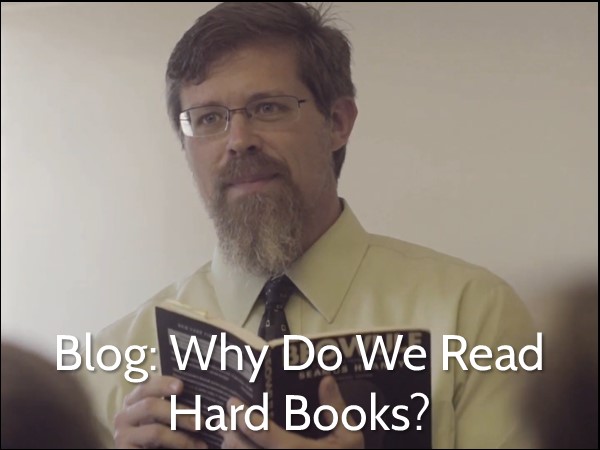
Paradise Lost. The first three times that I attempted to read this book on my own, I failed, never making it out of book 2. I was a literature teacher with several years of experience and at the beginning of my happy career at Rockbridge on my third failed attempt.
It’s a hard book. It’s a hard book, and Milton’s classical allusions, Latinate constructions, and theological asides were completely overwhelming to me, so I quit. I remember waiting at Annapolis Honda for my Civic’s oil change, trying to make sense of the thing. I finally abandoned the poem and comforted myself by asserting that “the Emperor has no clothes”: nothing that was this hard to slog through could be worth it.
And yet…
It is largely my fault that Paradise Lost is in our present 9th grade curriculum; I made my case to Ralph Janikowski and Mike McKenna in 2010, worked to maneuver Pilgrim’s Progress into the 8th grade curriculum to make room for Milton, and then, in the fall of 2011… My class load was reduced, I stopped teaching freshman literature, and I did not have the chance to teach the book for the next seven years. My deepest regret about that? Not having a chance to read Milton’s epic with Rockbridge students again.
And again.
And again.
Because it was a hard book, and it was worth it.
So let me address the question above: Why do we read hard books?
I freely acknowledge that, for their age and relative maturity, Paradise Lost is the hardest book in our curriculum for the students tasked with reading it… and then writing about it. I also acknowledge that, as I defend it, I am doing so from a place of sympathy: I know that it is hard, since I abandoned it several times myself.
Allow me first to challenge the assumption behind the question: “hard” is not the problem.
One of my favorite lines from A Tale of Two Cities describes Charles Darnay’s condition in London. The child of French aristocrats, he abandons their life and the wealth that came with it, moves to London under an assumed name, and is now making his way as a tutor. Dickens writes, “He had expected labour, and he had found it, and did it, and made the best of it. In this, his prosperity consisted.” As anyone who has read the book would know, the life of Darnay – with its labor, with its lower middle class trappings – is infinitely more rich than that of the aristocrats he left behind, at their ease but succumbing to their “leprosy of unreality.”
He chose a harder life not because it was hard, but because it was good.
And Paradise Lost, I will consistently argue, is good. Hard, but good.
In fact, looked at the right way, “hard” is just another way of acknowledging that the task involves cost: time, effort, the restructuring of the mind to grasp what is going on.
Thus, calling something “hard” is not so strongly negative as it first appears. In fact, looked at the right way, “hard” is just another way of acknowledging that the task involves cost: time, effort, the restructuring of the mind to grasp what is going on.
(An aside: what is the greatest benefit of math for any student? That it restructures the mind to think in a more organized, balanced, direct fashion. The constant query of, “When are we ever going to use this in real life?” thus entirely misses the point. In a very particular way, it does not matter if you ever use the quadratic equation again in your life; what you have gained is an ever-deepening ability to think clearly and appreciate something beautiful.)
Video games, which take us where we want to go anyway, are easy, and they alter the mind just as surely as potato chips alter my waistline. Healthy alteration of the mind is hard – as is the alteration of a pot-belly into abs of steel. The better abs, though, are not just useful for attracting a mate; they are actually a by-product of something that is just better for living: a healthy, fit body.
And struggling through math or Milton – leaning into the labor of it – can help to bring about that which is even more useful: a healthy, fit mind.
But people with abs of steel can be insufferably vain: this is true (I say this as a distinctly pot-bellied man). Is the goal of reading a hard book being able to look good because of my heightened mental acuity, just in time for next fall’s academic season? Of course not; the goal is to be able to get at the Truth, the goodness, the beauty that these works contain.
Greater minds than mine have defended the hard books of our curriculum for the goodness, beauty, and Truth found in them. I will add nothing to that here. I will confess that sometimes the complaint that “these books are too hard” arises because these books confront us with our own feebleness in the presence of something great (I write this as a confession of my own sins), and we have developed a society that tears down that which is great. Instead, we should see that, like a good, hard practice under the hot, August sun, the hard book prepares us for that which is even greater, for understanding and thinking more deeply, for going “further up and further in”.
Because the Bible, too, is a hard book, and we abandon the reading of it at our peril.
Instead, we should see that, like a good, hard practice under the hot, August sun, the hard book prepares us for that which is even greater, for understanding and thinking more deeply, for going “further up and further in”.
The History of Oral Exams at Rockbridge Academy

“It’s a historical method on how to examine someone and their rhetoric. It’s all about being articulate, thinking on your feet, putting together your thoughts, integrating your subjects, and expressing your world view.” That’s how Rockbridge’s Headmaster, Roy Griffith, described Rockbridge Academy’s oral examinations. These graded conversations between two teachers and a student are Rockbridge’s unique version of midterms. Every rhetoric student is assigned a fifty-minute slot in which they verbally answer questions about any material from across the subjects they have studied that year. Exams are most successful when students integrate information from multiple subjects in their answer while weaving in their Christian worldview. Thanks to the ingenuity and hard work of the Rockbridge Academy staff, oral exams became a tradition that has been benefiting our rhetoric students for years.
Back in 2007, the Rockbridge staff was struggling with the idea of exams. Midterms and finals felt like time consuming disruptions to learning, but the students' understanding of the material still needed to be assessed. Mike McKenna, Rockbridge’s Headmaster from 2000-2015, said, “We started by asking the question, "Why?" Why midterms and final exams? Do we have to do it the same old way that everybody does it?” It turns out, the answer is no. McKenna said, “We wanted to think outside the box to come up with a way to assess the students' understanding of what they were learning, but we also wanted to do it in a way that was in accordance with a classical model.” Ralph Janikowski, who was Rockbridge’s upper school principal from 2005-2016, came up with the solution that fit all of these criteria: oral exams.
The oral exams concept put Rockbridge into relatively uncharted territories in the world of high school. As far as Rockbridge knew, no one else—not even other classical Christian schools—were doing something like this. Rockbridge made oral exams more casual than typical midterms by encouraging students to take the conversation in the direction of a subject matter that interests them and to articulate the thought process behind what they are learning and why it is significant rather than asking obscure questions or simply getting the student to parrot information they have memorized. Heidi Stevens, a retired Rockbridge art teacher who was on staff at Rockbridge for twenty years, said that orals were originally meant to be something you could do without having to study; if you paid attention and participated in class you would be fine.
McKenna said, “I always wanted the students to feel like they were having a dinnertime conversation with Uncle Mike about what they were learning at school.” Despite this, the students are understandably intimidated in their first year of exams. But it seems that as the years progress, the students become more and more comfortable. Each sophomore class is almost always nervous, but juniors are usually a bit more comfortable, and seniors tend to enjoy the experience. Oral exams are actually more convenient for students because, “rather than taking an hour written exam in each subject over the course of a day or two, now they [have] a fifty-minute conversation with their teachers. And then they [are] allowed to spend the rest of the day getting some solid work done on their thesis papers,” said McKenna. Oral exams ended up being exactly what Rockbridge rhetoric students needed, in so many ways.
Fast forward fourteen years, and oral exams are still going strong, much in the same manner that they began. Two teachers still act as interlocutors, terrifying sophomores and exciting seniors for their fifty-minute graded conversation. Through the years of doing oral exams, the benefits this unique test offers have become apparent. The testing method itself gives the student more freedom to express themselves and what they believe. McKenna put it this way: “If I talk to you about your view of mathematics I can see whether you understand it from a biblical perspective or not. But, if I put a trigonometric equation in front of you and ask you to solve it, you could be a Secularist or a Christian and still solve that problem. I won’t understand your worldview.” Having a worldview and being able to winsomely express it is an important part of Rockbridge’s education.
In a blurb about oral exams in the 2007-2008 Rockbridge Yearbook, former Rockbridge teacher Donna Duarte said, “‘Orals are an appropriate form of evaluating a rhetoric student’s progress, and the goal is to indicate how the student is progressing toward an integrated biblical worldview.’”
Oral exams also provide students with ample future benefits. Nathan Griffith, Rockbridge teacher and former Rockbridge student, said, “Orals are preparing you to have a long conversation about topics you may not be comfortable talking about,” and also that “it’s a great opportunity to get comfortable talking to someone in authority over you.” Being able to think through difficult questions as well as verbally articulate answers are valuable life skills.
Emma Williams, Rockbridge eleventh grader, said, “I can just picture myself being really nervous for an interview or something, but now I will be much more confident having done orals.” Oral examinations fit perfectly into the rhetoric years as they test both knowledge and oratory skills, allowing a student to weave together what they have learned with their worldview. Oral exams are the optimal midterms for Rockbridge Academy because the integration that naturally occurs demonstrates that a classical education is a Christ-centered education.
Olivia Reardon, ‘22, loves to write and can usually be found reading a good book. She is part of a dance company and enjoys spending time with friends and eating ice cream.
VLOG: Pointing Students to Christ: Mr. Northup on Teaching Bible at Rockbridge Academy
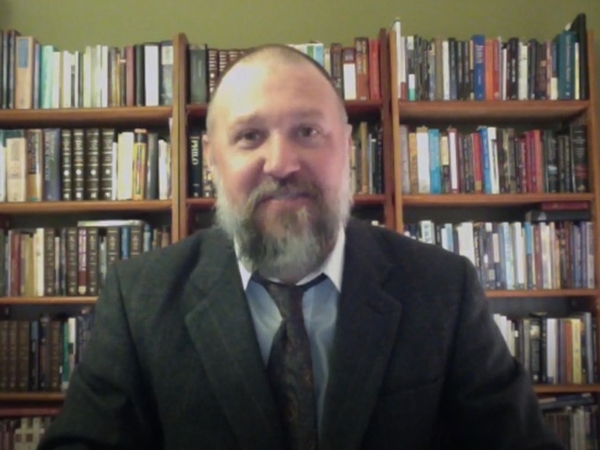
Since 2005, Mr. Nathan Northup has been faithfully teaching Bible at Rockbridge Academy in the upper school. He shares IN THIS VIDEO the heart of why we teach Bible at Rockbridge Academy. More than Bible knowledge, our desire is that each and every student would see and know and love Jesus, our Savior, and that they would be able to evaluate their whole range of life experiences in light of the Scriptures.
Mrs. Williams--Aiming High
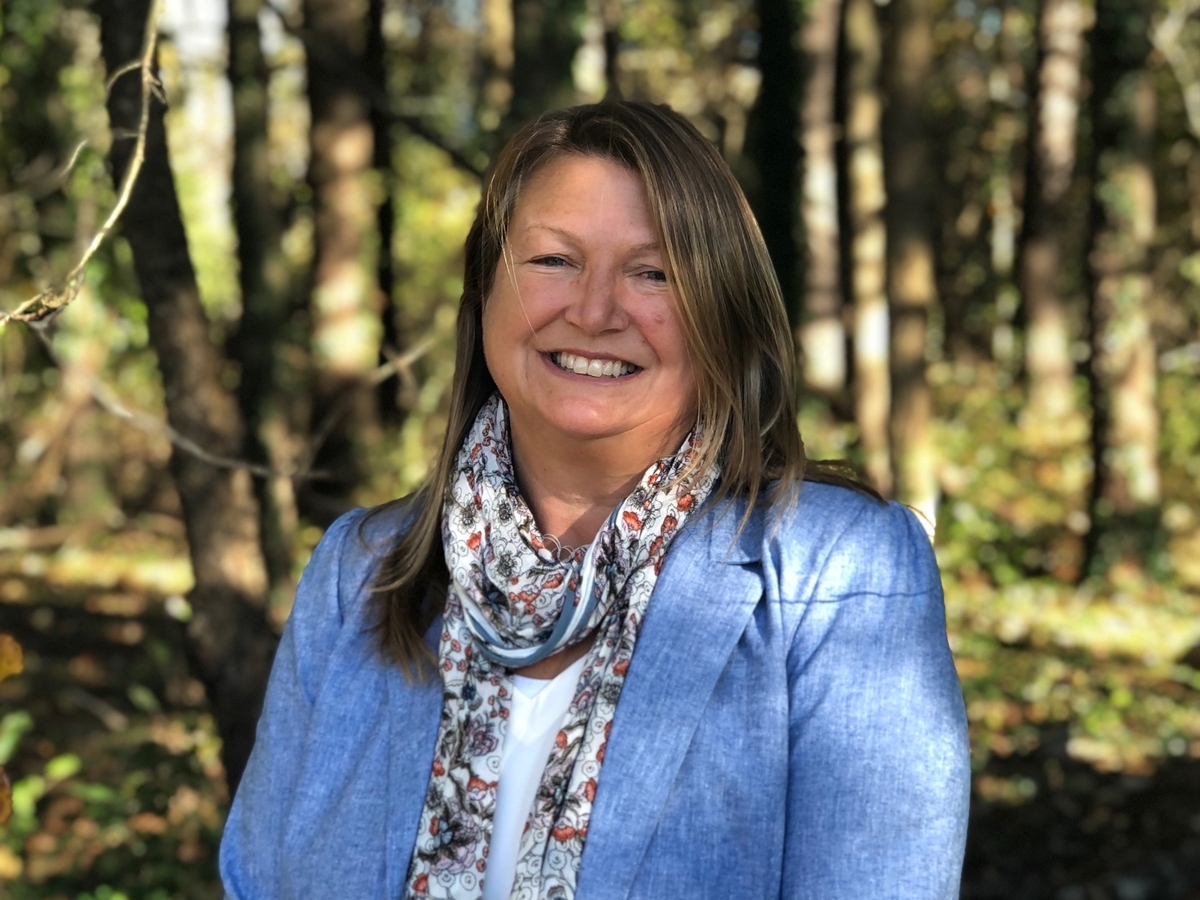
Mrs. Kim Williams is never without a mission. Whether she’s piloting airplanes, teaching medieval history in a 4th grade classroom, or raising her three children, she approaches her duties with determination and humility, giving God control of the cockpit. Many of us have benefited from her time teaching at Rockbridge—first 4th grade, now 10th grade Bible. But before she ever graded our papers, she served in the United States Air Force.
Mrs. Williams joined the Air Force when a recruiter came to her high school. Not only was joining the military a way to pay for college, but it offered her a chance to see the world and serve her country. She served 23 years total, 10 on active duty.
While on active duty, Mrs. Williams participated in several missions, but she especially remembers piloting the KC-135, “which was basically a big gas station in the sky,” she said. It flew in a circle at a fixed location waiting for planes to refuel. Sometimes, these planes would meet from two different Air Force bases across the country. Mrs. Williams described this meeting of two airplanes connecting mid-air in the same piece of sky as “a controlled collision.”
When she first became a mother, she left active duty and joined the Air Force reserves. During this time, she worked at various military bases, including Andrews Air Force Base and even the Pentagon. While at the Pentagon, she worked in the “Lessons Learned” office, where the Chief of Staff sent her team to various active duty units to interview soldiers who experienced an event or were part of a project that had remarkable mission impact. Gathering and publishing lessons like these could then educate or benefit the rest of the Air Force. “Maybe there was a big success story in a unit,” she explained, “and he might say, ‘Go capture why this was such a success. What made it a success?’” Along the way, Mrs. Williams learned her own lessons.
“Being in the military gave me confidence to try something new,” she said. “You’re always having to do something new. You just say, ‘Here I am, let’s figure it out.’”
While still in the reserves, she was called on an additional mission—teaching—a job she approached with the same can-do attitude. When she brought her daughter, Sarah, to Rockbridge Academy, she became interested in the Rockbridge mission. “I watched the teachers and how they had such a big influence on the young people they served,” she said, “and I thought, ‘Wow, this is a pretty neat mission, and I want to be a part of it.’”
At first, she thought she’d teach in the upper school. But when Mr. Mike McKenna, former Rockbridge headmaster, told her she’d teach 4th grade, she thought, “What in the world?” However, she soon came to love the age. “I love how they love you,” she says. “They’re not self-conscious, they’re just themselves. So, when Jesus says come to me like little children, this might be what he means, to come with hearts wide open, humble, and beautiful.”
Mrs. Williams taught 4th grade for 9 years. This past year, she transitioned to teaching the 10th grade Bibliology and Hermeneutics class. She taught many of her current 10th grade students when they were in grammar school, “so they know I’m crazy already,” she laughs. Despite the age difference, she hopes to integrate aspects of her 4th grade Bible curriculum into the 10th grade lessons, primarily using the book of Isaiah. Since Bibliology focuses on ideas, Isaiah will help her refer to tangible examples of those ideas. “God must have done that,” she said. “He puts these things on your heart.”
“It brings me a lot of joy to help people in the next step of their journey,” she said. “To watch people grow was more fun than flying airplanes, which perhaps not a lot of people would say.”
Mrs. Williams doesn’t fly airplanes anymore, but she still aims high. “Be ready for adventure,” she advises students. “Have a positive attitude in the midst of it, and be flexible, and have eyes to see those around you.” Though no longer serving in the Air Force, she’s still serving the Rockbridge community, and her unstoppable mission remains: pointing students towards the Lord.
Interview with Ivanna Rhodes: Novelist
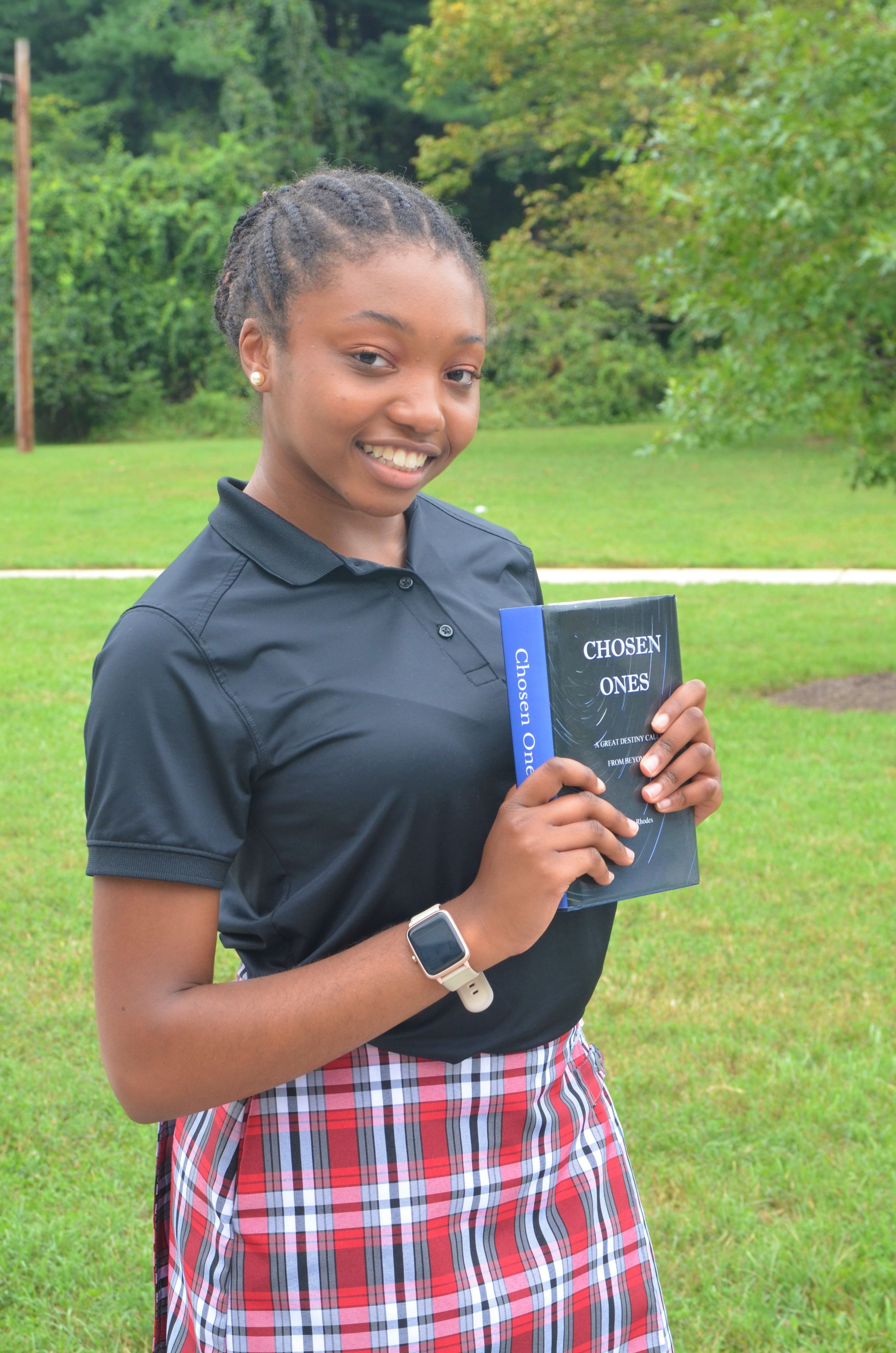
What was the process of writing and publishing Chosen Ones like?
“Publishing a book is not an easy process. After you finish writing something, in order to protect it from infringement, you have to get it copyrighted with the US copyright office so you can have all of your intellectual property protected. After that I started looking for an editor to edit it because I wanted to make sure it was completely fine before I started to put it out there. My editor is actually a former graduate of Rockbridge [Catherine Roshner], and she herself is an author with a major in English, so she knew what she was doing. My violin teacher knew her and recommended her to me and me to her, and so she took my first draft, and she did it in a month; she did content and grammar and style, all of that. She gave me her comments and I went from there. When I went to turn in my second draft to her though, she was unable to do it due to her own job, and so I decided that I would have to self edit. So I ended up doing an extra twenty-four drafts, all self edited, so it took a total of twenty-six drafts and it was only then that I was like, ‘okay, I think I can publish this.’”
How has your time at Rockbridge influenced your ability to write a novel?
“I always thought that I was an okay writer, and then I got to dialectic and Mr. Head’s writing class. Structured writing has not always been my thing, because with fantasy you can pretty much do whatever you want and no one will care, but with structured writing there are guidelines you must stick to. But it has been helpful because learning the right structure, even though it’s not always necessary in the realm of fantasy fiction, is still a very good skill to have and it is a skill I did not have. Literature classes and writing at Rockbridge has improved my strengths in research and in grammar and style.”
Is there a message or moral in Chosen Ones that you want your readers to take away?
“There are several messages and morals that I tried to bring out in Chosen Ones. One of the biggest is the theme of redemption. The idea that even those who have gone wrong can be turned back to the good side.”
How has your time at Rockbridge influenced the moral of your novel?
“At Rockbridge we read a lot of books that are fictional but have underlying moral themes like A Tale of Two Cities, or Macbeth, or stuff like that. So the moral was influenced by the fact that I started paying more attention to how the authors would hide the underlying moral value of their story underneath the fictional aspect of it. That definitely influenced the moral, especially how to do it in a way that it is clear, but also flowed well with the story.”
What would you tell someone trying to finish a book?
“Commit! You have to commit to finishing a book. Because it’s on the shelf it looks like it was easy, but it wasn’t. You must commit and you must be willing to go through both the hard and the easy in order to make it to the end. I know for me there were a lot of times I wanted to give up, I was like ‘this is too hard, I don’t even know what I am supposed to do.’ But I was like, ‘I’ve come this far and it would be a shame to stop because I quit.’”
Is there anything else about you or Chosen Ones that you would want people to know?
“Chosen Ones probably would not have gotten finished if it hadn’t been for my back surgery which I had the summer of 2019. It was a major surgery, I was on bed rest for six weeks. Because of all that downtime I had, I was able to get a huge chunk of it done. I had not been able to find time to do it before, so because of that I was able to do a lot of writing. I feel like if I hadn’t then it would probably still be in process today. So that was a huge blessing, and I am very glad for that time I had to finish it.”
Leading by Example: The Class of 2020's Impact on Rockbridge Academy
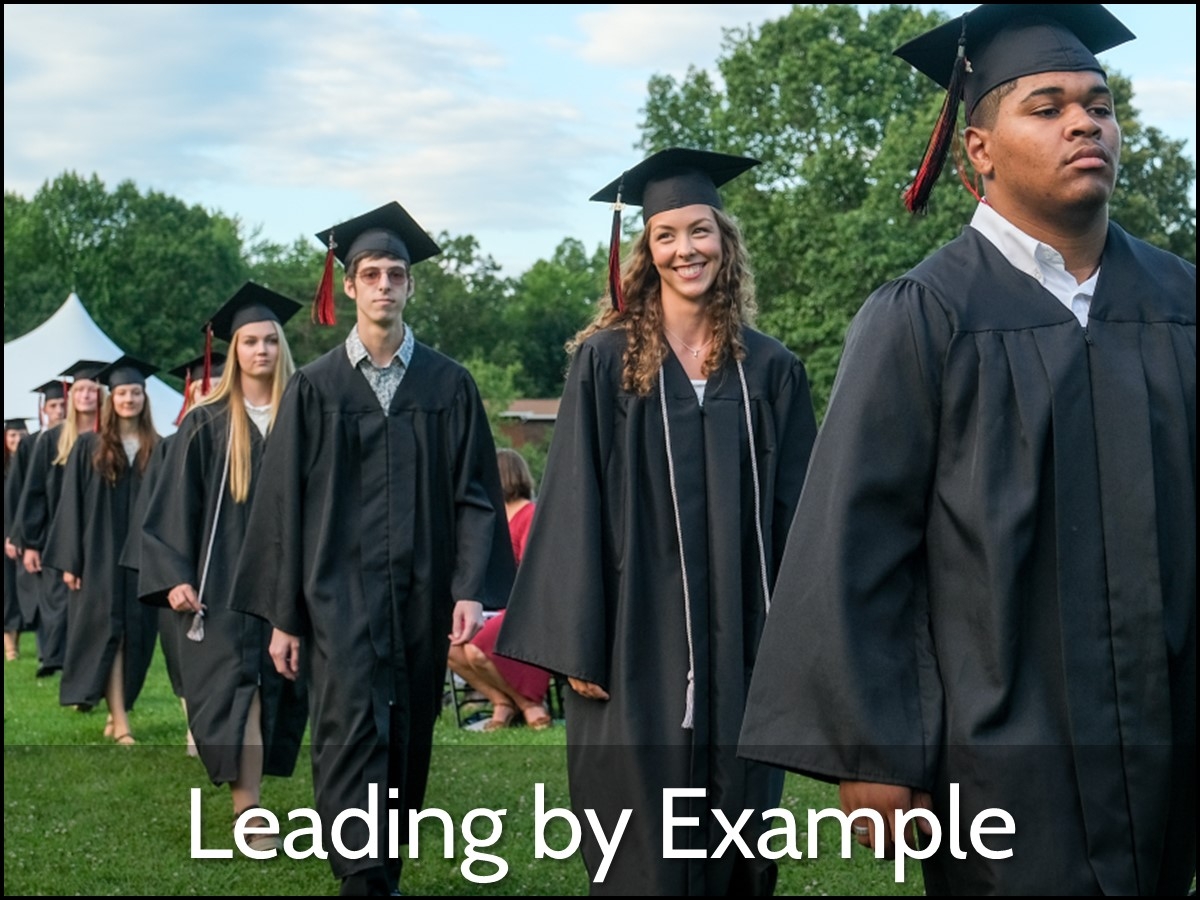
I was sitting outside in mid-July watching the first ever outdoor Rockbridge Academy graduation when it hit me. The young men and women in caps and gowns, that I had grown so accustomed to having around, weren’t seniors anymore. They were graduates—off to start a new chapter in their life, likely far away from Rockbridge. As the school year approaches, the idea that the class of 2020 won’t be there is becoming all too real. And, as a rising junior, watching this class graduate made me realize how I want to graduate: having made an impact, a difference in the lives of those I will leave behind. It was a privilege to watch this class graduate because they have done just that. This fall, the class of 2020 will be gone, off to do God’s will elsewhere, but through their exemplary leadership, they left behind lessons in love, joy, and faith that won’t be forgotten.
This class taught me much about how to love one another in a Christ-like manner. Their constant encouragement and support of one another is a great example of how to be a good friend. When my brother, Zach, tore his ACL, I watched his classmates come together and support him by praying for him, visiting him after surgery, and encouraging him through a difficult time in his life.
Not only was this class a tight knit bunch who cared strongly for one another, they poured out this love on younger students. As a new student at Rockbridge this year, I barely knew anyone, but on the first day of school multiple seniors went out of their way to get to know me. I stepped out of my car and was immediately welcomed by Lauren Bailey who later took the time to follow up with me at lunch. There was not a day that went by in which I didn't see a senior assisting someone else. Whether that was giving rides between campuses or to events, sharing helpful advice, or just being someone to laugh with, they were there and eager to serve. Their leadership in events such as FCA, sports, and clubs will surely be missed; but they have left me with a deeper understanding of how to love one another in Christ.
Radiant, abundant joy exuded from the class of 2020. On any given day you could hear laughter pouring into the halls from either twelfth grade homeroom. They kept laughing through quarantine in their late night zoom calls where they shared jokes and showed off their pets. These graduates brought their joy wherever they went, but that isn’t to say they were never serious; I have watched them tackle difficult tasks with persistence, carry each other's burdens, and deal with important matters discerningly. At the 2020 March for Life, Rockbridge’s group got separated into multiple small groups, many of which didn’t have adults in them. I witnessed the seniors take charge, letting people borrow their phones, offering to wait for parents with younger students, and leading everyone in making a human chain in order to get to the metro station across the march without losing anyone. I am continually inspired by this class’s ability to be hardworking and dedicated while still being able to laugh and have fun. This kind of joy is infectious and their laughter and smiles brightened Rockbridge. This class has shown me how to find the joy in every circumstance and share it with those around me.
Each graduate’s faith was highlighted through their demonstration of love for others and uncircumstantial joy. During quarantine, this class kept our FCA bible studies alive by way of Friday morning zoom calls. Ryan McDowell, Alex Lawing, and Jillian Schwartz led us through Phillipians and 2 Timothy where they explained God’s word and applied it to our lives while many other seniors offered valuable insights. This class has always been ready and willing to share their own stories in order to help or inspire others. My faith has been strengthened in indescribable ways from my time at Rockbridge, and these graduates have played a huge part in that. I am sad that their continual example won’t be around anymore, but I couldn’t be more grateful for the ways in which their faith has ministered to me.
This class has made a tremendous impact on myself and many other students. As a rising junior, my class will soon be in a position where we too can make an impact on the other students. Being an example is a responsibility that should not be taken lightly, and I am so thankful for the example of the recently graduated class. They taught me to never be too busy to help someone out, to take the time to enjoy the wonderful gifts God has given me, and to trust in the Lord for my future. I want to graduate having taught these lessons to the classes that come after me. This class will be missed deeply. However, after seeing and cherishing the effect they had on Rockbridge, I know they will continue doing great things for the Lord wherever they go. So, while Rockbridge won’t feel quite the same without them, their influence in how to love like Christ, be persistently joyful, and have a faith that can move mountains, will live long after they leave.
Olivia Reardon, ‘22, loves to write and can usually be found reading a good book. She is part of a dance company and enjoys spending time with friends and eating ice cream.
The Birth and Development of a Rockbridge Tradition
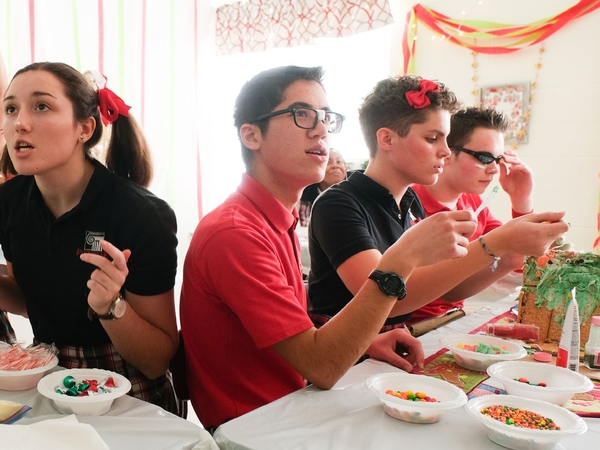
Chairs clatter, students squeal, rooms empty, and break looms. No it’s not the last day before summer vacation, but Rockbridge’s annual Captain’s Cup decorating competition, one of the most hectic days of the year. In a matter of hours, classrooms are stripped down and transformed into ornate displays of “Christmas” scenes, all for that coveted lunch (take-out from the restaurant of their choice) paid for by the school’s administration, not to mention the trophy.
Rockbridge has traditionally held its Captain’s Cup on the final day before Christmas break as a way to not only celebrate the holiday season, but also to promote community and fellowship among its students, teachers, and alumni.
The very first Captain’s cup took place in 2006 and was coordinated by then upper school principal Ralph Janikowsky. “By the time of the Christmas break, everyone was exhausted and no one was having any fun,” Janikowsky explained. “We decided to start the Captain’s Cup to encourage class camaraderie, prepare our hearts for Christmas, to provide some team building and leadership opportunities, and to let our students be creative and enjoy that last day.”
In its purist form, Captain’s Cup is a classroom decorating competition between upper school homerooms. For weeks, students plot, scheme, and vie for the best idea, one that will undoubtedly set their class apart as the best. In the end, decorations are brought in, actors are chosen, and a few lunch periods are lost in the process, but it’s all worth it once the finished product is presented. Ideally, each room will have tie-in to the holiday season, but as history has shown, this is only a tangential requirement.
According to former administrative representative Ellen Wallen, Mr. Janikowsky may have found inspiration for Captain’s Cup in a small scale Christmas door decorating competition which had already occurred between classrooms prior to 2006.
Janikowsky instituted and popularized the competition during his second year at the school, but what took place early on was not exactly the same Captain’s Cup we’ve grown to appreciate today. According to rhetoric literature teacher Monica Godfrey (who was a sophomore at the school in 2006), the event took time to develop and mature. She explained that in the early years, decorations were not as elaborate, likening it to those doorway competitions which preceeded Captain’s Cup.
“The expectations were a lot different then,” she said. “No one really transformed their rooms, so you could still tell you were in a school. Over the years things morphed as people became more creative and committed to setting themselves apart.”
She also explained that originally there were no actors in the rooms, and due to the small size of the school, teachers judged the rooms rather than alumni. Mrs. Wallen noted that she, along with Mrs. Davis and Mr. McKenna, were the first to hold this honor.
As the years advanced, Captain’s Cup continued to progress. The name “Captain’s Cup” was not even utilized until much later on, referencing Mr. Janikowsky’s experience in the Navy. Additionally, starting in 2011 the school opted to let the alumni play a key role in the event as judges, an element that remains to this day (per Mrs. Wallen and Mr. Keehner).
Former upper school principal Jerry Keehner stated that this choice continues to produce one of the best alumni events the school holds. “We love seeing them, and work hard to keep up that relationship,” he explained.
Class of ’15 alumna Caitlin Flanagan voiced her appreciation for this particular opportunity, “Returning to Rockbridge for Captain's Cup, especially because my family moved, is my only real opportunity to return to the halls and community that shaped me so much and for which I am so grateful,” she said. “A lot of my friends in college never return to their high schools, but I really treasure the time to see some of my old teachers and catch up with friends who I haven't seen in so long and wouldn't necessarily see during my time in Maryland otherwise. As long as I am in the area at that time of year, I really hope to be able to at least stop by, walk through those tiny little hallways, and thank God for four beautiful years there.”
In the past, we have had over sixty-five alumni participate in the festivities. As judges, the alumni are told to review each room and rank their three favorites. Once their ballots are all collected, Mr. Keehner tallies the scores and announces a winner.
